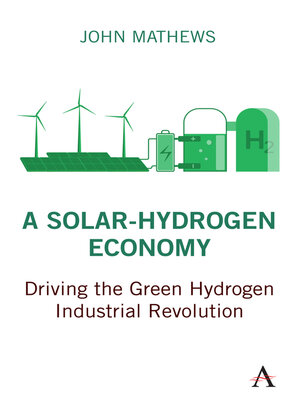A Solar-Hydrogen Economy
ebook ∣ Driving the Green Hydrogen Industrial Revolution · Strategies for Sustainable Development Series
By John Mathews

Sign up to save your library
With an OverDrive account, you can save your favorite libraries for at-a-glance information about availability. Find out more about OverDrive accounts.
Find this title in Libby, the library reading app by OverDrive.



Search for a digital library with this title
Title found at these libraries:
| Library Name | Distance |
|---|---|
| Loading... |
Guiding the emergence of a new green economy, based on a green industrial system and on green growth for its propagation, is the core challenge of our time. Efforts so far to switch to renewables in power generation have succeeded in partially transforming energy systems. Efforts to capture the process through imposition of carbon taxes or emissions trading schemes have fallen far short: these are policies based on simplistic comparative static economic frameworks involving changing prices but never engaging with the dynamic industrial drivers of change. A systemic perspective, focusing on the supersession of one technoeconomic system, based on fossil fuels, by another system, based on hydrogen, renewables and circular flows, is called for. The argument is developed that a new politics of energy is evolving from one based on fossil fuels to one where our industrial civilization is maturing and sees the manufacture of energy and energy devices as central to its continued survival.
|Guiding the emergence of a new green economy, based on a green industrial system and on green growth for its propagation, is the core challenge of our time. Efforts so far to switch to renewables in power generation have succeeded in partially transforming energy systems. Efforts to capture the process through imposition of carbon taxes or emissions trading schemes have fallen far short: these are policies based on simplistic comparative static economic frameworks involving changing prices but never engaging with the dynamic industrial drivers of change. A systemic perspective, focusing on the supersession of one technoeconomic system, based on fossil fuels, by another system, based on hydrogen, renewables and circular flows, is called for. The argument is developed that a new politics of energy is evolving from one based on fossil fuels to one where our industrial civilization is maturing and sees the manufacture of energy and energy devices as central to its continued survival.
In this book I construct an image of the green industrial revolution drawn from perspectives that are under-appreciated in conventional economics. Economic progress is viewed in terms of capture of increasing returns generated by manufacturing, with learning curves reducing costs as the market expands, in successive waves of circular and cumulative causation. Secondly, technoeconomic change is viewed as creative destruction, whereby competitive dynamics drive economic progress. And third, the economy is viewed as clusters of value chains replacing each other in a chain reaction of interactions propagating new chains and their interlinkages and eliminating incumbent chains. These perspectives, drawn from heterodox economics framed in disequilibrium, supplemented by a view of the emergence and diffusion of green hydrogen as a novel (sixth) technoeconomic paradigm surge, enable us to make sense of the dynamic green transformation emerging out of the matrix of the black fossil fuel system, where it is the future of our industrial civilization that is at stake.







